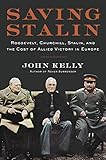Saving Stalin : Roosevelt, Churchill, Stalin, and the cost of allied victory in Europe / John Kelly
Language: eng Publication details: New York: Hachette Books, 2020Description: 372 p.: ill.; 24 cmISBN:- 9780306902772
- 940.5322
- B D 753.2 K29s 2020
| Item type | Current library | Home library | Collection | Shelving location | Call number | Copy number | Status | Date due | Barcode |
|---|---|---|---|---|---|---|---|---|---|
 Libro
Libro
|
Biblioteca Juan Bosch | Biblioteca Juan Bosch | Recursos Regionales | Recursos Regionales (2do. Piso) | B D 753.2 K29s 2020 (Browse shelf(Opens below)) | 1 | Available | 00000150024 |
Browsing Biblioteca Juan Bosch shelves, Shelving location: Recursos Regionales (2do. Piso), Collection: Recursos Regionales Close shelf browser (Hides shelf browser)

|

|

|

|

|
No cover image available | No cover image available | ||
| B D 285.8 C335C 1991 Casanova : el rostro oculto de un seductor / | B D 285.8 C335F 1995 Las mujeres de Casanova / | B D 412.7 T574c 2011 Conversations with power : what great presidents and prime ministers can teach us about leadership / | B D 753.2 K29s 2020 Saving Stalin : Roosevelt, Churchill, Stalin, and the cost of allied victory in Europe / | B D 766.82 R766L 2004 Rommel : as military commander / | B D 766.82 R766m 1957 Memorias : los años de derrota / | B D 766.82 R766S 1985 Con Rommel en el desierto : a cuantos sirvieron en el desierto / |
The day before the Day of the Dead --
Stalin regains his nerve --
Saving Stalin --
War without end --
One day in December --
The worst of times --
The longest summer --
We've got to feel we have victories in us --
General determination and General "They will beat us!" --
Turn of the tide --
Death stands at attention --
The end of the beginning --
The Polish agony --
Mr. Churchill at Harvard --
Commander in Chief --
The city of a hundred promises --
A walk in the sun --
"Nice chap, but no general" --
The two faces of war --
The Grand Alliance at high tide --
Apocalypse --
Have yourself a merry little Christmas --
Yalta: The Grand Alliance at high tide --
Never forgive, never forget --
Birthday and death.
"In the summer of 1941, Harry Hopkins, Franklin Roosevelt's trusted advisor, arrived in Moscow to assess whether the US should send aid to Russia as it had to Britain. And unofficially he was there to determine whether Josef Stalin -- the man who had starved four million Ukrainians to death in the early 1930s, another million in the purges of the late 1930s, and a further million in the labor camps of the Gulag -- was worth saving. Hopkins sensed that saving Stalin was going to be a treacherous business. In this powerful narrative, author John Kelly chronicles the turbulent wartime relationship between Britain, America, and the Soviet Union with a unique focus on unknown and unexplored aspects of the story, including how Britain and America employed the promise of a second front in France to restrain Soviet territorial ambitions and how the Soviets, in their turn, used threats of a separate peace with Germany to extract concessions from the western allies. Kelly paints a vivid picture of how the war impacted the relationship between the leaders and war managers among the Allies. In Saving Stalin, for the first time, the war becomes a major character, co-equal with the book's three other major characters: Stalin, Roosevelt, and Churchill"--


There are no comments on this title.